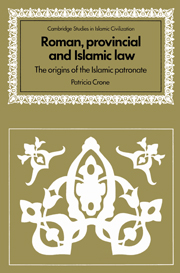6 - The case for the Roman Near East
Published online by Cambridge University Press: 16 October 2009
Summary
Despite their general similarity of social organisation, the Greeks and the Romans had adopted opposite solutions to the problem of accommodating freedmen in the society into which they had been manumitted. The Greeks excluded them from citizenship, relegating them to a collective state of dependence as resident aliens; but the Romans on the contrary accepted them as citizens and subjected them to individual ties of dependence.
The dependent status of the early Roman freedman arose from his incorporation into the manumitter's household. All members of the early Roman household were subject to the paternal authority of the head of the household, the paterfamilias. The paternal power of the Romans was unique in that it lasted as long as the pater was alive, not simply until his sons come of age, as is normally the case. All his descendants were thus subject to it regardless of their age and sex, as was his wife and other members of the household such as slaves and freedmen. All were thus bound to obey them, and what is more, all were deprived of individual rights in private law. In particular, persons in potestate could not own, but only hold a peculium which automatically reverted to the pater on their death. There was no difference between the freedman and the filiusfamilias in this respect, nor did such public office as either might enjoy affect their status in private law.
- Type
- Chapter
- Information
- Roman, Provincial and Islamic LawThe Origins of the Islamic Patronate, pp. 77 - 88Publisher: Cambridge University PressPrint publication year: 1987



